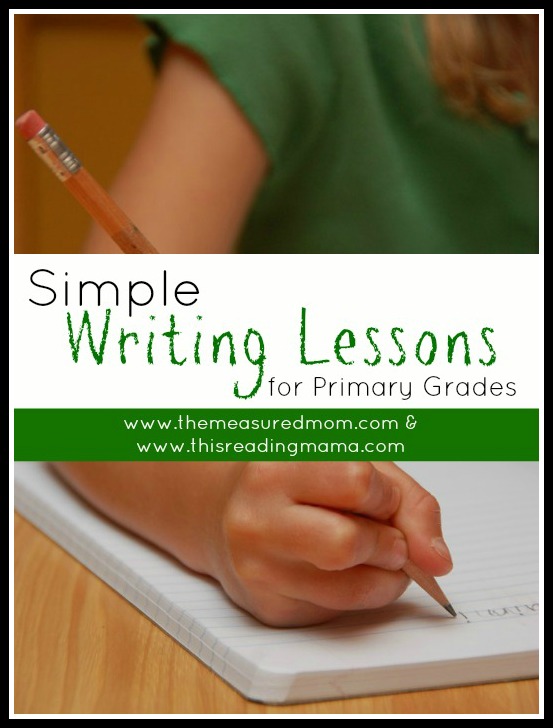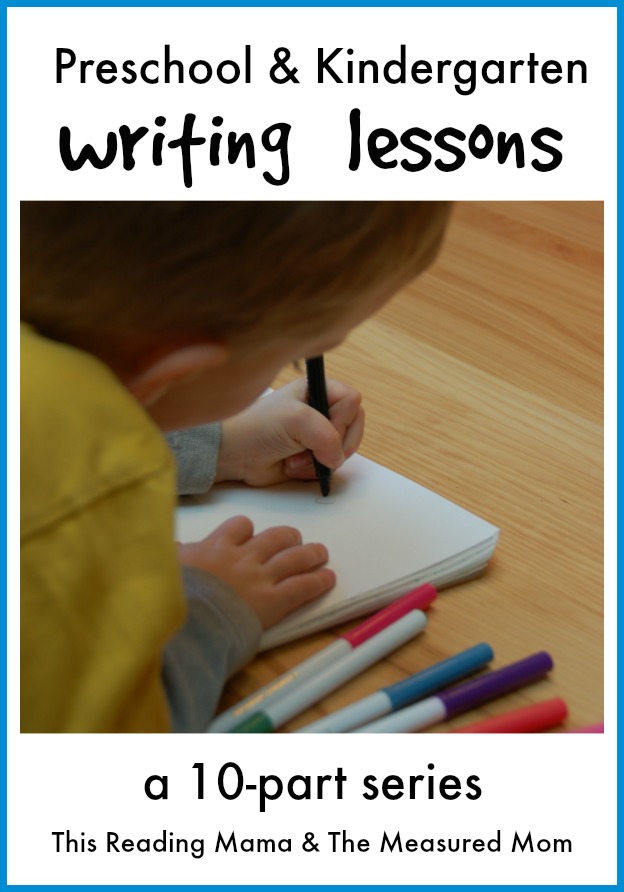I am super pumped to announce an upcoming and awesome series that Anna of The Measured Mom and I are tackling together: Simple Writing Lessons for Primary Grades {for 1st and 2nd grades}. I am so excited because, besides reading, writing has to be one of my favorite subjects to teach! “Eww,” you may respond.
Well, we hope to shift your thinking just a bit. Our desire it to help you see writing in a different light…writing as a craft. {Links for all posts in this series can be found at the bottom of this post.}
*This post contains affiliate links.
Writing as a Craft
What exactly does that mean? Many times, writing is taught primarily through writing prompts, copy work, or worksheets. These things, in and of themselves, are not bad. But when these are the main diet, writing becomes one-dimensional. But writing as a craft takes writing to an entirely different level.
Students are given developmentally appropriate choices, treated as authors as they learn the writing process, and taught writing in the context of writing. Writing has purpose, meaning, and many dimensions. If you want to explore writing as a craft further or the writing process, please hop over to my 5 Days of Unleashing the WRITER in Your Child.
What are Simple Lessons?
Simple lessons, also known as mini-lessons, are short and explicit times of teaching that “teach into our [writers’] intentions.” {The Art of Teaching Writing, 193} I’m sure that about clears it up for you, right? I’ll break it down word-by-word:
- Short Lessons– 10-15 minutes at the most.
- Explicit Teaching– It doesn’t leave anything to chance. It’s all “spelled out” for the student. Explicit means that you show HOW to do something instead of TELLING how to do something. You do it WITH the child. You let your child hear your thinking as you write in front of your child. {Writing Essentials, 15}
- Teach Into– Teaching is done in context; within the context of writing itself. It isn’t a ditto sheet. It isn’t copy work. It is real writing.
- Writers’ Intentions– Instead of deciding ahead of time what I am going to teach, I look into the student’s writing {see bullet point above} and ask myself, “What is the one thing I can suggest or demonstrate that might help [my child] the most?” {The Art of Teaching Writing, 194} which leads me to…
How Do I Know WHAT To Teach my Young Writer?
We want our teaching to be developmentally appropriate; meaning right where the student “is at”. If the child already knows the information, we’re wasting time. If the information is WAY over his head, we’re only frustrating him {and ourselves}. What we need to teach the child can be found as we become students ourselves, watching how our kids’ write and where they start to become confused in their writing.
For example, if I notice my child putting a period at the end of every line of work as she writes, I can clearly see that we need to work on where punctuation goes. Instead of telling her where punctuation goes, I SHOW her.
It would sound something like: “I need to write a thank you note to grandma. I’d like your help.” Start writing, with your child beside you. At the end of the first line say something like: “I don’t need a period here because I will wait until the end of my sentence.” When I get to the end of each sentence, I make a big deal about it. “Oh, that was a complete thought. Let’s stick a big, fat period there {or whatever punctuation is needed}.”
As you keep writing the note, make a point to focus and talk about where you are putting the punctuation AS you write in front of your child. {Just a side note: Your topic for your simple lesson is something you can model over and over through different kinds of writing. It is not just a one-shot deal.}
It is explicit. Showing. Not just telling.
It is developmentally appropriate. It’s what your child needs to work on. Notice, I didn’t find this idea in a writing curriculum or workbook. I became a student of my child and taught exactly what needed to be taught at that time.
It is simple. I write. I talk. She observes.
Suggested Simple Lessons
A few suggested simple lesson topics might include: 1- spelling words, 2- conventions, 3-modeling a technique or strategy, maybe something you found in a book you were reading aloud together, 4- reinforcing a strategy already modeled, 5- word choice, 6- writing in different genres {poetry, fiction, non-fiction}, or 7- how to edit your work. There are MANY more topics you could select for your simple lessons, but you want to teach into what they confuse as they write. As we add posts to our series, you’ll get to see more examples first-hand. 🙂 I can’t wait!
Simple Lesson Links for Primary Grades Series
Follow along each week as we share simple lesson ideas for 1st and 2nd graders {Most links also include FREE printables}:
- Pre-Writing Strategy: Make an Expert List (The Measured Mom)
- Pre-Writing Strategy: Use a Graphic Organizer (This Reading Mama)
- Writing Strategy: Choose a Tiny Topic (The Measured Mom)
- Writing Strategy: Make it Interesting for the Reader (This Reading Mama)
- Writing Strategy: Ask Questions (The Measured Mom)
- Writing Strategy: Use Invented Spelling (This Reading Mama)
- Revising Strategy: Choose Different Words (The Measured Mom)
- Revising Strategy: Re-read Your Writing (This Reading Mama)
- Editing Strategy: Use a Kids’ Dictionary (The Measured Mom)
- Editing Strategy: Use a Checklist to Edit (This Reading Mama)
- Publishing Strategy: Make a Book (The Measured Mom)
- Publishing Strategy: Share Your Writing (This Reading Mama)
*You can also take look inside my son’s Writer’s Notebook to see how we organize all these printables and his writing time.
Have Young Writers?
Check out our 10-week writing series for Preschoolers and Kindergartners. Click HERE or on the image above.
~Becky


This is going to be such a great series! Pinning so I can follow along. 🙂
Thank you. It will be a challenge, but we’re up for it. 🙂 Thanks for pinning.
What an exciting unit!
I’m a little excited myself. 🙂
You do a fantastic job of teaching us how to teach our kids. Very excited for this series. I just went a writing for Kindergarten seminar. It was by Nellie Edge. I think you would like her stuff.
Thank you!
Planning for the next academic year. So excited about implementing these ideas.
Thanks.
Rowena
Awesome! 🙂
You inspire me every day with the amazing project you come up with Becky! Can’t wait to follow and learn from this series. It’s just what my daughter needs to at this time. Shared on my Writing Board for you too!
Thank you, Kim! 🙂
I’m seriously excited about this series. Will you and Anna be posting any ideas/modifications for kids with special needs, too, by chance?
The simple lesson ideas will be very specific lessons we’ve used with our own young writers, so I’m sure the lessons could easily be used for kids with special needs as well. We hope to break it down and SHOW you {not tell you} how to do this with your own child.
With talking about the process of writing, it sounds a lot like writer’s workshop. When I taught first and second grades, writer’s workshop was so much to set up and do. Do you homeschool and use a writer’s workshop format? I am not sure how to set up a WW for my children ages 1-8. No I wouldn’t do formal lessons with the 1 year old, but my 3 is very interested in writing. There was so much good stuff in WW, but it was overwhelming to begin. (Eventually, the district’s decided it needed something better and it ended.) I am not a planner or the organized sort, so just looking for suggestions on how to get ready to implement what I learn from your posts.
Hi there, I just sent you a rather lengthy email in response to your questions here. I realized after hitting “send” that it had no subject. 🙂
Hi,
I just came across this wonderful series lessons you have put together, and I wanted to say thank you. This fall I am starting up an informal writer’s workshop with a small group of 8-10 year olds, and these lessons are certainly a great starting point for us. I’m looking forward to following along as you publish further lessons.
Thanks!
Wonderful! I love Writer’s Workshop!!
I am a relatively new follower of your blog and share a passion and love for teaching reading and writing. I taught students with reading disabilities before staying home with my little ones. I used to be a big supporter of writer’s workshop until I started to learn about the classical model of education. Now I think that there are more meaningful learning opportunities to engage children in instead of writer’s workshop. Writer’s workshop is a great and effective way to manage children but not an effective method of teaching children to communicate their thoughts and ideas. I could not find any research that supports writer’s workshop as an effective practice. Children don’t have enough experiences to draw from to write stories. Instead they should be learning by listening to stories crafted by our best authors and memorizing and copying their work. Then when they have enough experiences and knowledge to write on their own all of the vocabulary, syntax and semantics will be there. They will know how to construct a sentence because they have read, listened to and copied sentences.
“memorizing and copying their work”??? In my opinion, young children DO have enough experiences and knowledge to write something – it may not look like adult writing, but good grief! And vocabulary, syntax, and semantics don’t just magically appear in their writing – it usually needs to be explicitly taught.
I am a first year teacher teaching first grade. This writing series has filled my mind with a solid and inspiring foundation to encourage the young writers in my classroom. Sincerely, thank you, for the detailed dialogue illustrating how you taught each lesson and the free printables to support each lesson. Your blog is an incredible resource that I value and appreciate! Thank you for taking the time to enrich my teaching with positive modeling of your own.
You are very welcome! Enjoy that first year. It can be a tough one… at least it was for me. 🙂
Thank you so much for this organized method for helping our kids with their writing!! My oldest (10) needed just a little more help with creative writing, as it is not a priority at his school. I found your site a few years ago while searching for material for my youngest, now seven, and it has since been my go-to spot for all things homeschooling! Thank you again for all your hard work. It is extremely helpful and greatly appreciated.
You are so welcome! 🙂